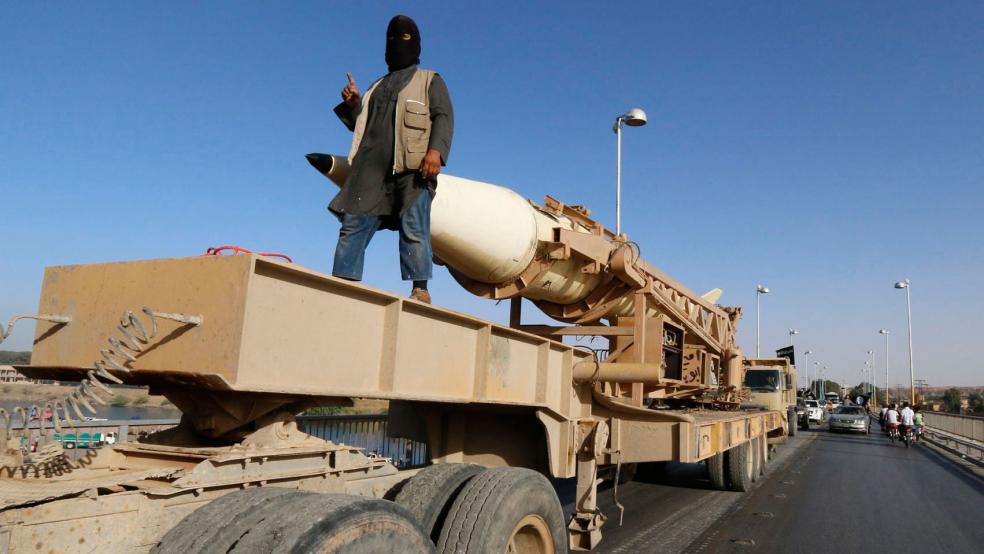After almost two years, nearly 11,000 airstrikes and more than $6.5 billion in taxpayer money spent, there are new reasons to be cautiously optimistic about the U.S.-led campaign against the Islamic State.
The Pentagon on Friday capped what has been a grim week following the deadly terror attacks in Brussels by announcing it had killed the ISIS finance minister, Haji Imam, whose real name is Abd al-Rahman Mustafa al-Qaduli. Many analysts believe he was the group's No. 2 leader.
Related: ISIS Propaganda Video Uses Trump Comments to Celebrate Brussels Attacks
"We are systematically eliminating ISIL's cabinet," Defense Secretary Ash Carter said during a press briefing, before declining to provide details about the operation. "We've taken out the leader who oversees the funding for ISIL's operations, hurting their ability to pay fighters and hire recruits."
“The momentum of this campaign is now clearly on our side,” he later added.
The elimination of such a high-value target will likely boost the spirits of U.S. allies in the fight against the terror group, especially after the bombings in Brussels, the home of NATO, which killed more than 30 people and injured hundreds more.
It also comes the day after Iraqi military forces, backed by U.S. air power and Kurdish Peshmerga forces, reportedly kicked off the offensive to retake Mosul, Iraq’s second largest city.
Carter acknowledged that while killing the second-in-command is good news, it’s not the final step to wiping out the extremist group.
Related: ISIS Marches Towards Libya’s Oil Crescent, Despite US Air Strikes
"Striking leadership is necessary, but it's far from sufficient," he said. "Leaders can be replaced. These leaders have been around for a long time — they are senior and experienced and eliminating them is an important objective and result.”
Joint Chiefs of Staff Chairman Gen. Joseph Dunford, appearing alongside Carter, agreed that the U.S.-led coalition was gaining momentum, but cautioned: "By no means would I say that we're about to break the back of ISIL or that the fight is over."
Still, the announcement comes as military officials in Iraq and Syria tell The Washington Post that the Islamic State is essentially frozen in place or retreating, a big reversal from this time two years ago when ISIS made a lightning-fast march across the two countries.
Dunford said Western forces have “begun to undermine the narrative” that the group is some kind of unstoppable force, but was quick to add that while the group hasn’t made gains on the ground in months, that “hasn't precluded them from conducting terrorist attacks, and it hasn't precluded them from conducting operations guerrilla operations than the conventional operations that we saw when they were seizing territory.”
Related: How Long Will It Take for the Iraqis to Recapture Mosul?
The developments raise another critical foreign policy question: With ISIS squeezed on its home turf, will the network sharpen its focus on training and inspiring more followers to attack Europe?
The Associated Press reported earlier this week that ISIS had 400 fighters trained to strike Europe in waves of attacks.
Carter recognized there are connections between ISIS forces in the Middle East and the militants who carried out the attacks in Brussels and Paris.
They range from fighters who have trained and participated in ISIS operations in Iraq and Syria and return to their home countries to individuals who are recruited and trained by experienced jihadists but haven’t trekked to the Middle East, as well as some who are self-radicalized.
The connection is relevant because “if they're directed, we want to get at the people … eliminate the people who are directing them. But even if it's just inspiration, it still takes you back to Iraq and Syria and the need to eliminate the sources of that inspiration,” Carter told reporters.
The Pentagon chief warned that the anti-ISIS fight will take time but “we're certainly gathering momentum and we're seeing that that momentum is having effect. And we're broadening both the weight and the nature of our attacks on” the terror group.
“We've learned a great deal, and we continue to learn about who is who in ISIL so we can kill them, about how they get their finances so we can dry that up,” he said, using the other common acronym for the group.





